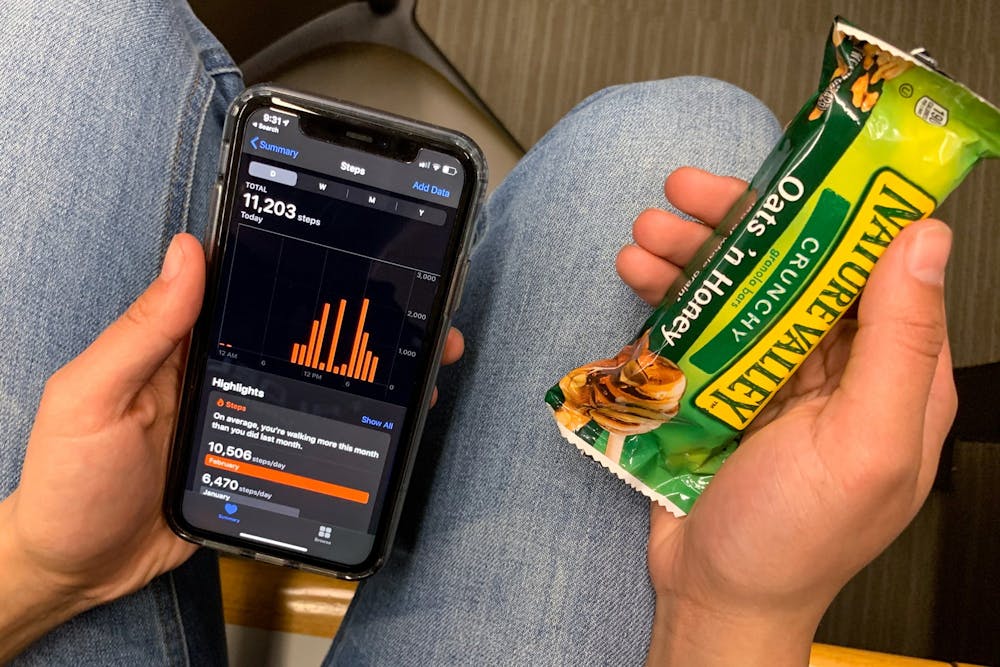
Students in NURS 065 were required to track their nutrition using a diet tracking app.
Credit: Samantha DelmanNursing professors view assignments that ask students to track their daily diet as a critical tool to teach nutrition. But some students worry the practice will trigger disordered eating.
As part of NURS 065, Fundamentals of Nutrition, students are required to record their calories, fat intake, food intake, and general nutrition using a diet-tracking app. Students are also asked to analyze and reflect on their eating habits as part of the assignment. NURS 112, Nutrition: Science & Applications, a course intended for non-Nursing students, also assigns a similar project.
NURS 065 professor Monique Dowd said the assignment's aim is to help students better understand and reflect on their personal health. However, she also said concerned students may complete a personalized, alternative assignment, that can range from analyzing case studies to studying nutritional trends that lead to chronic diseases.
“The main purpose [of the project] is to give an opportunity to explore [students'] eating habits, and the outcome is hopefully that they will be able to analyze and improve their diet,” Dowd said.
College sophomore Marlies Jongens, who took NURS 112 in spring 2019 and completed a calorie-tracking assignment, said the project felt “too personal” and "unnecessary."
“I had to tell people that I didn’t really know like what exactly I was eating, [which is] just kind of weird,” Jongens said.
College junior Christina Miranda is the president of Penn's chapter of the national eating-disorder awareness and advocacy group, Project HEAL. She said the nursing assignments can be “triggering” for students who are recovering from eating disorders and those who are prone to them.
“This assignment would be like asking a recovering alcoholic or a person with a genetic predisposition to alcoholism [to] go home a binge drink every day for a week,” Miranda said.
Miranda said many eating disorders like anorexia are characterized by obsessive, controlling behaviors, like recording calorie intake and burn. Though Miranda has not taken the course herself, she said students with eating disorders have recently reached out to her with their concerns about the exercise.
“[The assignment] could trigger an eating disorder for someone who may be in a high stress state or genetically predisposed,” Miranda said.
Miranda said an alternative option should become a more accessible and solidified part of the assignment.
“[The alternate assignment is] something that the students would have to personally request from her,” Miranda added. “It wasn't given as a choice, like, 'you have this option of an assignment or a different one,' and you choose one or the other.”
Nursing senior Naomi Shapiro, who took NURS 065 in spring 2016, said she enjoyed learning more about her own eating habits during the assignment, but understands why some students might be concerned.
Nursing and Wharton first year Yujiao Qiu, who is currently taking NURS 065, said she was not concerned about the assignment personally, but said it is important to be mindful of others that might have suffered from eating disorders.
"I don't personally know anyone with an eating disorder but I do think it is a very important thing for nurses to take into consideration," Qiu said. "Especially because I think body image will be a concern for a lot of people, especially girls."
Dowd said many students have requested and completed alternative assignments in the past, and she feels she makes such options well-known to her students.
“I have a written announcement in my Canvas [page] that anyone uncomfortable with this project for any reason [can] email me and we can design an individualized project,” Dowd said.

Nursing professor Bart De Jonghe, who teaches NURS 112, said he also offers alternatives to students who are uncomfortable with recording their diet, but stressed that the assignment is very common in introductory nutrition courses in universities around the country.
Dowd and De Jonghe both said they do not require students to explain why they want an alternative version of the project, and they encourage students who feel uncomfortable with the assignment to communicate with them.
Other Nursing students value the personalized aspect of the original assignment.
Nursing junior Linda Chan, who took NURS 065 in spring 2019, said the project made her realize her own unhealthy eating habits and encouraged her to take steps to change them.
“As a Nursing student, I should be healthier, and I should be a certain example for others as to what my meal should look like,” Chan said. "I was definitely not reaching that [healthy] expectation that most people have.”
Nursing senior Gabrielle Ramos, who took NURS 065 in spring 2017 and completed the original assignment, said Dowd is very approachable and understanding, and thinks students are usually comfortable reaching out to her with their concerns.
“She's kind of like a mom, who also is a great teacher,” Ramos said. “I, myself, have had to reach out to her with extenuating circumstances and other classes.”
Nursing senior Monica Aber, who took NURS 065 in spring 2018, agrees with Ramos, and said Dowd is very empathetic. Aber added that she did not feel stress in the class to conform to a specific diet, only to gain a better understanding of healthy nutrition.
"There's never pressure on what is super healthy and what you shouldn't be eating," Aber said.
Ramos said the assignment helped her achieve professional goals as a nurse, such as bringing a more personal experience to patients struggling with nutrition or weight loss.
“One of our main roles [as a nurse] is to be a teacher at the bedside,” Ramos said. “If you're telling your patient to eat healthier, or to work on certain goals, I think [knowing] what your own diet is and seeing it on paper is just helpful.”
The Daily Pennsylvanian is an independent, student-run newspaper. Please consider making a donation to support the coverage that shapes the University. Your generosity ensures a future of strong journalism at Penn.
Donate







